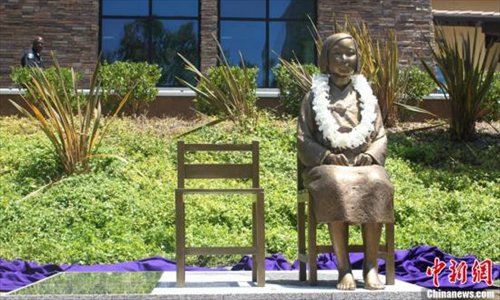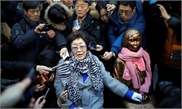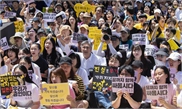Criticism swirls as Japan festival kicks out ‘comfort women’ film

A statue of "Comfort Woman," which is set to expose Japanese troops' crimes in World War II, is unveiled in Glendale Central Park near Los Angles. Photo: CNS
A local film festival in suburban Tokyo has come under fire for dropping a movie examining views on the highly controversial issue of sex slavery and Japan's wartime military brothels.Organizers of the film festival in Kawasaki City said they had opted to drop the film after local officials raised concerns.
The controversy comes after an exhibit in central Japan was shut down for months earlier this year over the display of a statue of a sex slave, and with relations between Japan and South Korea badly frayed over war-time issues.
Shusenjo: The Main Battleground of The Comfort Women Issue is a documentary examining the debate over so-called comfort women, who were forced to work in wartime Japanese military brothels during World War II.
Mainstream historians say up to 200,000 women - mostly from Korea, but also other parts of Asia including China - were forced to work in the brothels.
The head of the festival organizers said he was "deeply ashamed of a decision that may result in pressure on freedom of expression," but cited concerns from local officials as well as worries about the "security" of volunteers staffing the festival.
Some of the people interviewed in the film, by Japanese-American director Miki Dezaki, have filed suit against him, claiming they were not aware the interviews would be used in a movie for public release.
Kawasaki City, which provided nearly half of the festival's budget, reportedly expressed concerns about the lawsuit in its conversations with organizers.
Kawasaki officials however denied pressuring organizers to drop the film, with one saying they merely questioned "whether showing such a film is appropriate."
Bilateral relations between Japan and South Korea have recently frayed over a long-running dispute on the use of forced labor during World War II, with the two sides trading retaliatory measures.


